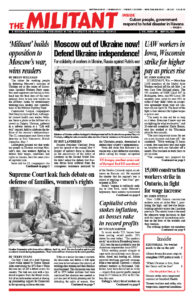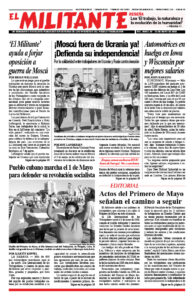“When Ukraine is free, Tatars will be free. Of course, the struggle for our national rights will continue, but nothing like what we face under Russian occupation,” Melek Maksudoglu recently told the Militant. She got to know the paper in London in 2014 at demonstrations supporting the Maidan uprising in Ukraine and opposing Moscow’s subsequent occupation of Crimea. Tatars are the native population of the Crimean Peninsula, with a long history of struggle against national oppression.
Maksudoglu now lives in Istanbul, where — like many in the millions-strong Tatar community in Turkey — she has joined protests against the Russian invasion of Ukraine.
“Supporters of the invasion try to appeal to Tatars as Muslims, saying Putin defends us,” she said, describing the political debate within Turkey. “How can they say that? He is killing innocent people.” Some even resort to antisemitism, she said, pointing out that Ukrainian President Volodymyr Zelensky is Jewish.
“But I also worry that the sanctions against Russia will only hurt ordinary people. The rich have ways to protect their money and businesses.” Ever-harsher sanctions by the U.S., U.K. and European governments, aimed at crippling the Russian economy, come down hardest on working people and make it harder to mobilize opposition within Russia against the invasion.
“Some people are starting to repeat old anti-Russian insults,” Maksudoglu said. “But it’s not ordinary people in Russia who are the problem, it’s the government.”
Following the Maidan — the 2014 popular rebellion in Ukraine that overthrew the pro-Russian regime of Viktor Yanukovych — Moscow invaded Crimea and later annexed the peninsula. “On Feb. 28, 2014, people woke up with tanks in the streets,” she said.
The occupiers launched a campaign of terror against Tatars and other opponents. The Mejlis, the national leadership of the Tatars that leads opposition to the occupation, was outlawed. Its president, Refat Chubarov, and its long-time leader, Mustafa Dzhemilev, were both banned from Russian-occupied Crimea.
Maksudoglu emphasized that the overwhelming majority of Tatars opposed the annexation. “Those who defended it were ‘excommunicated,’” she said.
The repression of Tatars by the Putin regime continues. Three Tatars, including Mejlis leader and journalist Nariman Dzhelyal, are on trial, framed up for allegedly sabotaging a gas pipe. According to the Kharkiv Human Rights Group, the only “evidence” against them comes from secret witnesses. Tatars have been abducted from Crimea and put on trial in Rostov, Russia, where they’ve been given long prison sentences.
Today many Tatars are in Ukraine, fighting shoulder to shoulder with the Ukrainian people to defend their independence. Maksudoglu gave the example of Gulsum Khalilova, a Crimean Tatar journalist now living in Kyiv who reports on Crimea and what Tatars are facing.
In 2019 a Russian court put out an international arrest warrant, accusing her of involvement with an armed group opposed to Moscow’s occupation of Crimea. “She’s very courageous. She says they drove her out of Crimea, but they won’t drive her out of Kyiv,” Maksudoglu said.

